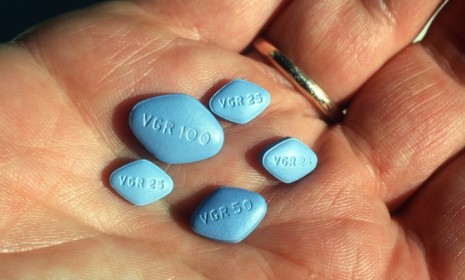Stendra: A guide to the new FDA-backed Viagra rival
Vivus, the manufacturer of a new erectile dysfunction drug, says the pill can work in as little as 15 minutes, which would make it the first "on-demand drug" for sex

A free daily email with the biggest news stories of the day – and the best features from TheWeek.com
You are now subscribed
Your newsletter sign-up was successful
Last Friday, the Federal Drug Administration (FDA) approved a new erectile dysfunction drug, Stendra, which its creators are touting as a superior alternative to Viagra. Erectile dysfunction, or the inability to keep an erection, affects more than 30 million men in the U.S., and sales of treatment drugs exceeded $5 billion last year. Here's a look at the potentially lucrative newcomer:
What is Stendra exactly?
The FDA-backed medication, known chemically as avanafil, is in the same class as drugs like Viagra, Cialis, and Levitra. All "inhibit the same enzyme, PDE5, and work by increasing blood flow to the penis," says USA Today. What separates Stendra from its competitors, however, is its ability to work 30 to 60 minutes faster than other pills. While Stendra is supposed to be taken 30 minutes before sexual activity, studies have shown that the drug can work in as little as 15 minutes. "You can argue this is the first potential on-demand drug [for sex]," Dr. Irwin Goldstein, co-author of a recent study looking at Stendra's effectiveness, tells CNN.
The Week
Escape your echo chamber. Get the facts behind the news, plus analysis from multiple perspectives.

Sign up for The Week's Free Newsletters
From our morning news briefing to a weekly Good News Newsletter, get the best of The Week delivered directly to your inbox.
From our morning news briefing to a weekly Good News Newsletter, get the best of The Week delivered directly to your inbox.
Who makes it?
Stendra is made by a company called Vivus, Inc., based in Mountain View, Calif. The company is also responsible for the anti-obesity pill Qnexa, which is pending FDA approval. Stendra is currently Vivus, Inc.'s only product on the market.
Does Stendra have side effects?
Common side effects include headaches, redness of the face, nasal congestion, and back pain. Like Viagra and other PDE5 inhibitors, Stendra can cause "color-vision changes," and a few people have reported sudden loss of vision in one or both eyes, and also a loss of hearing, says the Wall Street Journal. The new drug "shouldn't be taken by men who take nitrates for chest pain because the combination of the two drugs can cause an unsafe drop in blood pressure."
A free daily email with the biggest news stories of the day – and the best features from TheWeek.com
Should Viagra's makers be worried?
Stendra will sell well, but it probably won't be a Viagra-killer. The new drug is projected to generate around $68 million in sales next year, a paltry amount when compared with Viagra's estimated $2 billion, says Bloomberg. There are actually larger concerns on the horizon for both companies: Patents for Cialis and Levitra will expire in 2016 and 2018, respectively, meaning "generic competition" is on the horizon. And non-branded Viagra is expected to hit pharmacies as soon as 2019. In short, Vivus will be "rolling a rock up a hill on the generic side," analyst Michael King tells Bloomberg.
Sources: Bloomberg, CNN, USA Today, Wall Street Journal
-
 ‘My donation felt like a rejection of the day’s politics’
‘My donation felt like a rejection of the day’s politics’Instant Opinion Opinion, comment and editorials of the day
-
 Trump wants a weaker dollar but economists aren’t so sure
Trump wants a weaker dollar but economists aren’t so sureTalking Points A weaker dollar can make imports more expensive but also boost gold
-
 Political cartoons for February 3
Political cartoons for February 3Cartoons Tuesday’s political cartoons include empty seats, the worst of the worst of bunnies, and more